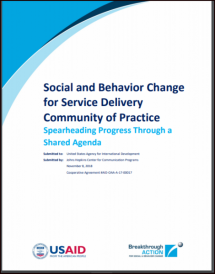Social and Behavior Change for Service Delivery Community of Practice Spearheading Progress Through a Shared Agenda
Social and behavior change (SBC) for service delivery refers to using SBC processes and techniques to motivate and increase uptake and/or maintenance of health service-related behaviors among intended audiences. SBC for service delivery is distinguished by its focus on service interactions: the use of SBC to motivate clients to access services (before services); to improve the client-provider interaction (during services); and to boost adherence and maintenance (after services). The concept includes considerations of social and cultural norms that impact service use (or non-use) and delivery, the physical environment in which services are delivered, and the communication that takes place between a client and provider.
The SBC for Service Delivery Community of Practice (CoP), which focuses on family planning and maternal and child health, unites representatives from donor and implementing partner organizations and other technical experts, who work to improve SBC for service delivery at the individual, household, community/normative, and structural/policy levels.
One of the CoP’s main goals is to establish a shared agenda to unite practitioners and decision-makers around priority areas in family planning and maternal and child health service delivery. Through consultative meetings, a survey among CoP members, and other communications, SBC for service delivery practitioners repeatedly called for action in three key areas.
Accordingly, CoP members agree to prioritize:
- Provider Behavior Change
- Measurement and Indicators
- Health Service Referrals
Last modified: December 8, 2020
Language: English

